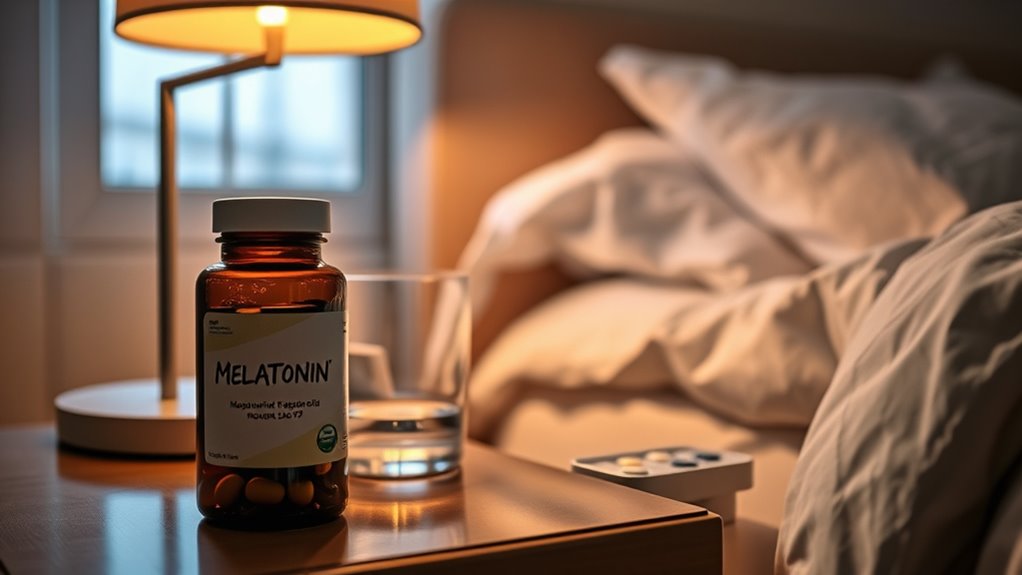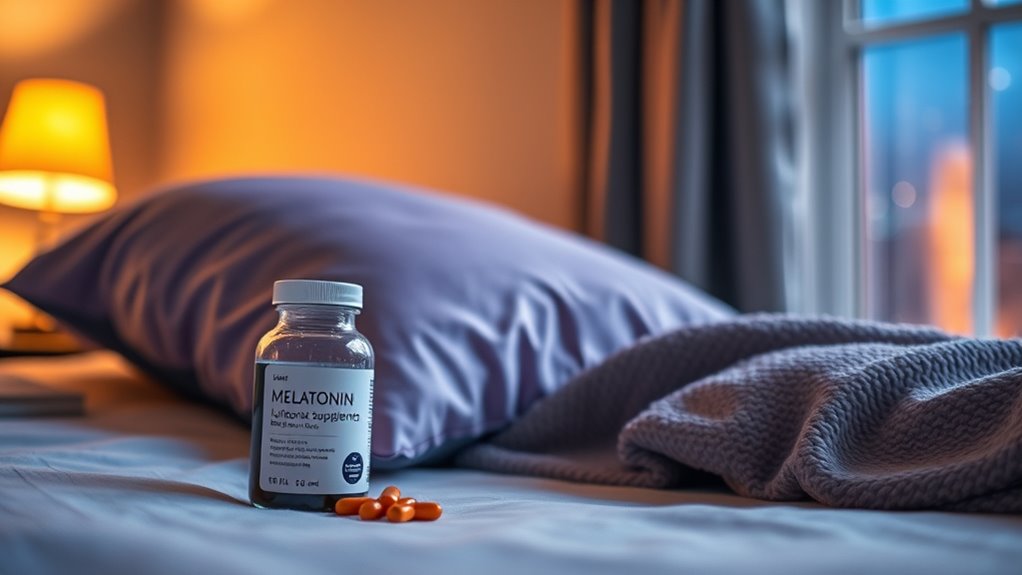Melatonin supplements help regulate your sleep by signaling your brain that it’s time to rest, especially when your internal clock is off due to jet lag, shift work, or sleep disorders. They support your circadian rhythm and can make falling asleep easier. However, their effectiveness varies, so proper dosage and timing matter. If you’re curious about how to use them safely and maximize their benefits, there’s more to discover about their role in sleep health.
Key Takeaways
- Melatonin regulates sleep by signaling the brain to prepare for rest, aligning sleep patterns with natural light-dark cycles.
- It is effective in managing jet lag, shift work, and circadian rhythm disorders by helping reset the internal clock.
- Melatonin’s effectiveness varies; it may not work for sleep issues caused by stress, anxiety, or other health conditions.
- Proper dosage and timing are essential to maximize benefits and minimize side effects like dizziness or daytime drowsiness.
- It should be used as part of overall sleep hygiene and under medical supervision for best results.

Have you ever wondered if melatonin supplements can genuinely improve your sleep? If you’re struggling to get restful nights, you might have heard about melatonin’s potential to regulate your sleep cycle. Melatonin is a hormone your body naturally produces to help control your circadian rhythm—the internal clock that signals when it’s time to sleep and wake. When your circadian rhythm is disrupted, whether from jet lag, shift work, or irregular schedules, sleep disorders can develop, making it harder to fall asleep or stay asleep through the night. In such cases, melatonin supplements are often considered as a possible remedy to help reset your internal clock and promote better sleep.
The primary way melatonin supports sleep is by signaling to your brain that it’s time to wind down, aligning your sleep patterns with natural light-dark cycles. When taken as a supplement, melatonin can be especially helpful if your circadian rhythm is out of sync. For example, if you’re experiencing jet lag after crossing multiple time zones or working night shifts, melatonin can help your body adjust more quickly. It’s also helpful for certain sleep disorders, such as delayed sleep phase syndrome, where your internal clock is delayed, causing you to fall asleep very late and wake up late. By supplementing with melatonin, you may be able to shift your sleep schedule earlier, making it easier to fall asleep at a normal hour and wake up refreshed.
However, it’s important to understand that melatonin isn’t a universal cure. While it can be effective for some, it doesn’t work the same for everyone, and its benefits can depend on the underlying cause of your sleep issues. If your sleep disorder stems from stress, anxiety, or other health conditions, melatonin alone might not resolve the problem. Additionally, taking too much or using it improperly can lead to side effects, such as dizziness, headaches, or daytime sleepiness. It’s best to consult with a healthcare professional before starting melatonin, especially if you’re on other medications or have health concerns.
Using melatonin supplements appropriately can also help prevent potential flushing issues or interactions with other medications.
Frequently Asked Questions
Are Melatonin Supplements Safe for Long-Term Use?
You might wonder about the long-term safety of melatonin supplements. While they’re generally considered safe for short-term use, the long-term safety isn’t fully established. It’s essential to take into account dosage, as high doses could cause side effects or disrupt your natural sleep cycle. Consult your healthcare provider for personalized advice, especially if you plan to use them long-term, to guarantee safe dosage considerations and monitor any potential risks.
Can Melatonin Help With Jet Lag or Shift Work?
Imagine arriving at a new destination, feeling the weight of travel fatigue, your body out of sync. Melatonin can help with jet lag by aiding your circadian adjustment, making it easier to fall asleep at the right local time. It’s especially useful when crossing time zones, helping you reset your internal clock faster and reduce fatigue. For shift workers, it can also support adapting to irregular schedules, easing the shift and improving sleep quality.
What Are Common Side Effects of Melatonin Supplements?
You might wonder about the side effects of melatonin supplements and their safety concerns. Common side effects include dizziness, headaches, and nausea, which are usually mild. Some people may experience vivid dreams or changes in sleep patterns. While generally considered safe for short-term use, it’s wise to consult a healthcare professional, especially if you’re pregnant, nursing, or taking other medications, to avoid potential safety concerns.
How Should I Choose the Right Melatonin Dosage?
Choosing the right melatonin dosage is like finding the perfect key to open your sleep. Start with a low dose, around 0.5 to 1 mg, and adjust based on your personal sensitivity. Consider dosage timing—taking it 30-60 minutes before bed works best. Listen to your body’s signals and consult a healthcare professional if needed, as everyone’s response can differ like snowflakes.
Are There Interactions Between Melatonin and Other Medications?
You should be aware that melatonin can have drug interactions with certain medications, affecting how they work. Always check with your healthcare provider before combining melatonin with drugs like blood thinners, immunosuppressants, or antidepressants. Your provider can guide you on proper dosage considerations and help prevent any adverse effects, ensuring safe use alongside your current medications. Never ignore potential interactions when considering melatonin supplementation.
Conclusion
If you’re worried about taking supplements, remember that melatonin is naturally produced by your body. Using it thoughtfully can help regulate your sleep without harmful side effects. It’s not a magic fix, but when combined with good sleep habits, it can make a real difference. So, don’t hesitate to give it a try—your body already knows how to use it, making it a safe, effective option to improve your sleep quality.








